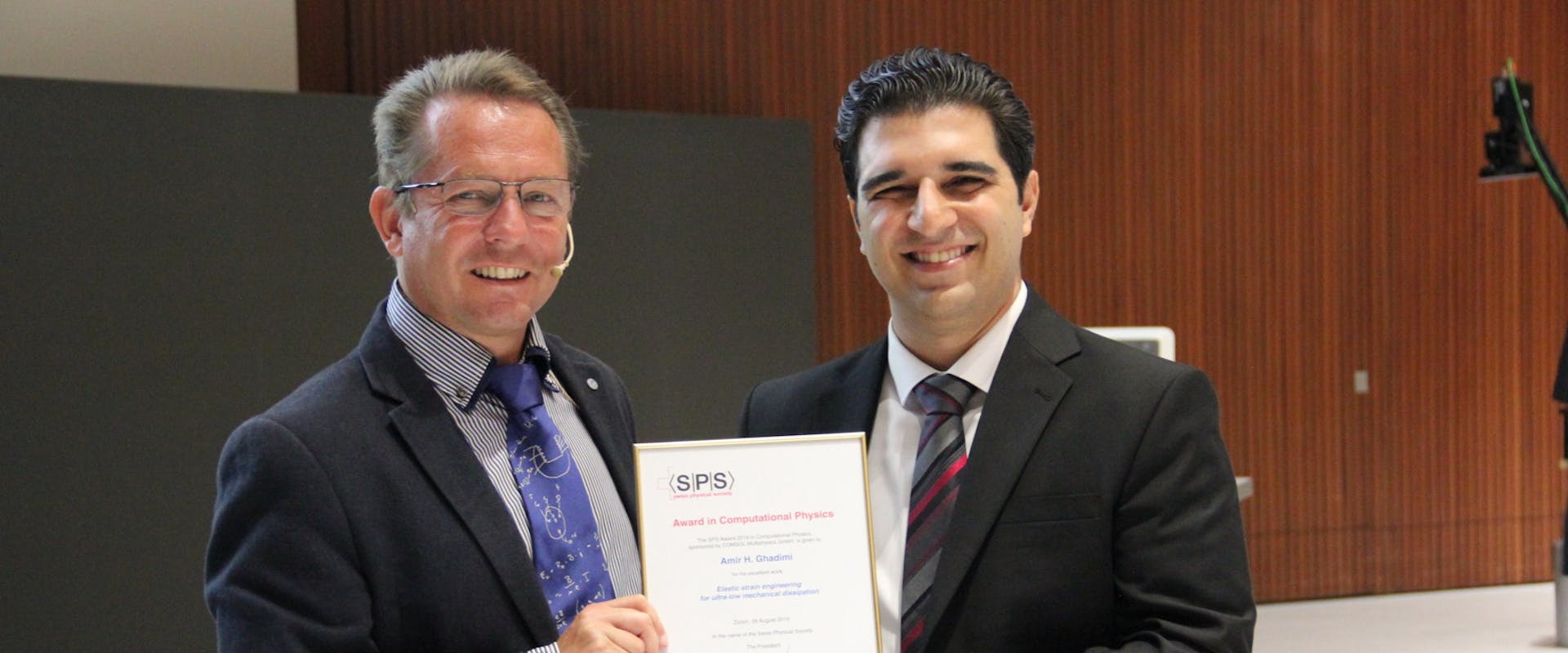23 June 2021
2021 EPS-QEOD Thesis Prize
The 2021 EPS-QEOD Thesis Prize for Applied Aspects, has been presented to Dr. Maxim Karpov. The biennial award rewards excellence in PhD research and scientific communication in quantum electronics an...
CSEM is pleased to announce that Dr. Ghadimi is the proud recipient of the prestigious 2019 Swiss Physical Society’s (SPS) award for exceptional research by a young researcher in the field of computational physics. Based on his PhD research completed at EPFL, “Elastic strain engineering for ultra-low mechanical dissipation,” Dr. Ghadimi’s research around quantum effects on micro-mechanical resonators is helping improve the performance of precision sensor technologies.

Awarded by an award committee to those on cusp of their physics career, Dr Ghadimi is currently a part of the CSEM Micro and Nano Systems Division. At the center, Dr. Ghadimi’s scientific breakthrough is envisioned to be embed into CSEM’s next generation of high-performance quantum sensing technologies. His discovery has a huge potential to be used in a diverse range of demanding applications including: preventive maintenance, energy and resource exploration, environmental monitoring and life sciences.
For more information about the SPS Award, please visit the Swiss Physical Society’s website.
Dr Ghadimi has joined CSEM within its PostDoc for Industry program.
Mechanical oscillators have a rich history and role in precision sensing and timing. Their application ranges from atomic force microscopes, filters within cell phones, sensitive accelerometers and MEMS sensors to gravitational wave detectors and quantum information processing. The dissipation of the mechanical oscillator plays a key role in many of these applications, by setting the thermal noise limit for sensitivity. In the quantum world, it is the mechanical quality factor (Q) - that determines the thermal decoherence rate, limiting the ability to observe quantum effects of the micro-mechanical resonators. Increasing the mechanical quality factor of micro-mechanical resonators not only improves the performance of mechanical-based sensors, but also provide a new approach to observe the quantum effects of mechanical resonators.
In recent years, advances in material strain engineering, understanding of phononic crystals and nanofabrication have allowed the creation of mechanical oscillators with unprecedented quality factors. Elastic strain engineering utilizes stress to realize unusual material properties. During his PhD research, Dr. Ghadimi and his colleague at EPFL, demonstrated that geometric strain engineering combined with “soft-clamping” technique could produce an unprecedentedly high quality factor in nano-mechanical resonators. At room temperature, these devices could achieve a force sensitivity of ~1 aN /√Hz (aN=10-18N), performs hundreds of quantum coherent cycles, and attain quality factor of about 109 at megahertz frequencies. These results signal a paradigm change in the ability to engineer and suppress dissipation in nano-mechanical systems, and have far-ranging impacts in precision sensing and quatum science. The results of this research have been published in Science magazine and also featured in Science Daily’s news & views segment.
A.H. Ghadimi, S.A. Fedorov, N.J. Engelsen, M.J. Bereyhi, R. Schilling, D.J. Wilson, T.J. Kippenberg. “Elastic strain engineering for ultralow mechanical dissipation”, Science, eaar6939, 2018. DOI: 10.1126/science.aar6939